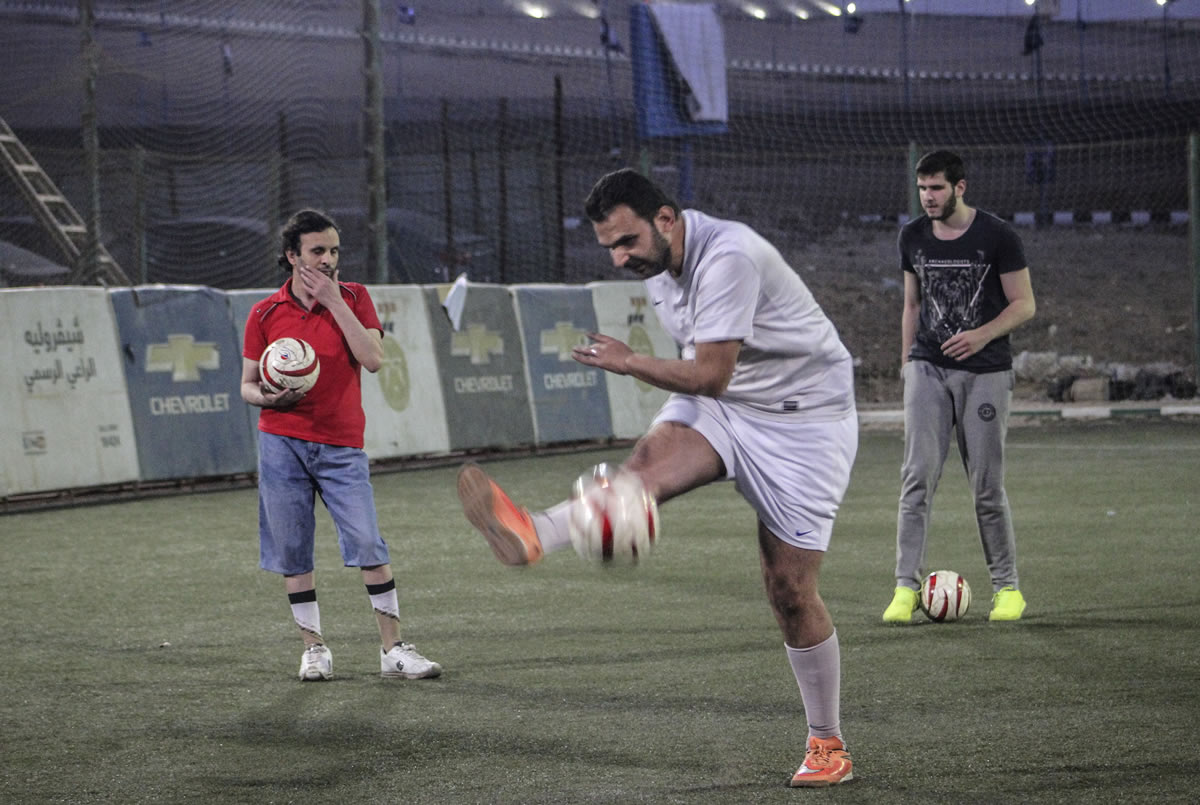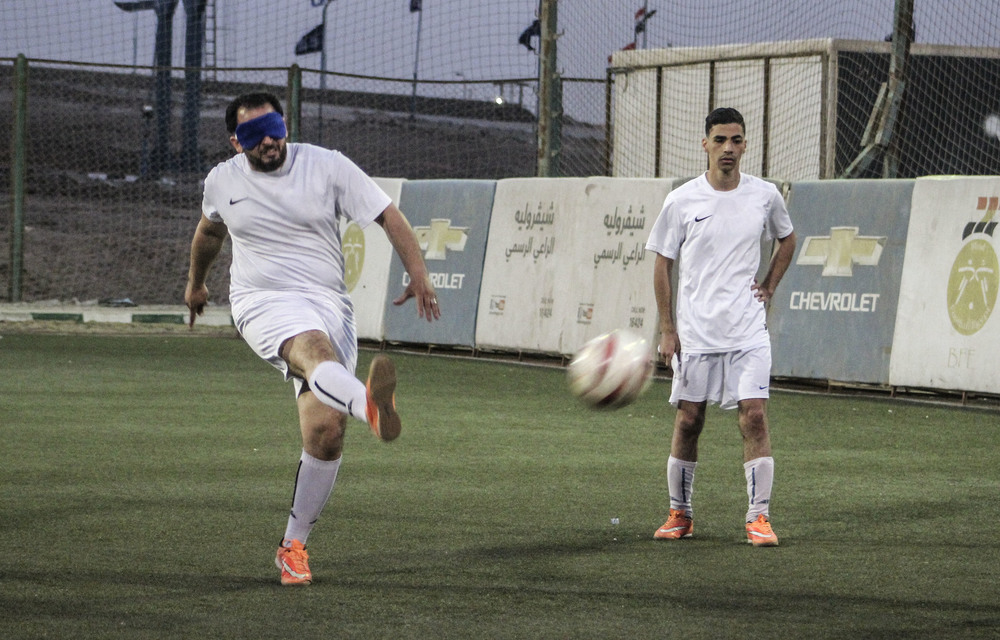Blind football represents hope and belonging for Egypt’s one million visually impaired.
The set-up couldn’t have been more perfect. The ball landed softly in front of Mostafa Abdel Rahman and he tapped it forward, picking up speed. He veered left, skilfully picking off the opposing team’s last defender, and then, with only the goalkeeper left ahead of him, took aim at the far corner of the net. Before the keeper could react, the ball whizzed past his out-stretched fingers, smacking against the net behind.
“Goal!” shouted captain Ali Abou El Nasr from the sidelines, and Abdel Rahman’s team erupted in back-slapping celebration.
On any given evening in Cairo, a scene like this plays out thousands of times over, as groups of Egyptians lace up for club matches and children chase balls down neighbourhood back streets across the city.
But this particular match had a twist. Abdel Rahman and his teammates were wearing what looked like heavy black eye masks, thick enough to blot out the hazy Cairo twilight completely. Their ball, meanwhile, rattled and clanged as it rolled down the field, alerting the players to its speed and location.
This was a practice session of Blind Football Egypt (BFE), the country’s first professional football team for blind and visually impaired athletes.
“There is no difference between us and anyone sighted who plays football,” says Wael Essam, a computer science teacher who was one of the first players for the BFE, which formed in 2014. “Practising football or any sport is very important: it develops you on a physical level but also trains your mind, teaches you how to think strategically.”
Globally, blind football’s star is rising rapidly. Since the 1980s, when the first five-a-side national championships took place in Brazil and Spain, the sport has spread to dozens of countries. In 1997, Europe and North America held the first continental championships, followed by the first blind football world championship a year later. In 2004, it became a summer Paralympic sport.
Blind football could change lives for the better
In theory, few countries are more fit to become blind football powerhouses than Egypt, a football-mad nation with an exceptionally high rate of visual impairment and blindness. About one million of Egypt’s 93-million people are blind and another three million are visually impaired, according to the World Health Organisation (WHO).
Egypt has more people with trachoma – an infectious eye disease that causes blindness – than any other country in the world, according to 2013 data from the WHO, and an unusually high proportion of cases of blindness that are caused by inherited conditions, fuelled in part by a high rate of marriage between blood relatives in the country, according to data published in the Community Eye Health Journal in 2007.
“In general, many blind people tend not to move a lot [and] the situation is even more difficult for the visually impaired living in developing countries [like Egypt],” says Abou El Nasr, one of the team’s founders, who is sighted. In Cairo, for instance, chaotic streets, uneven pavements, and poor public transportation infrastructure often severely limit even the most basic mobility and independence of blind people, keeping many confined by default to their homes or schools.
That, in turn, can lead to a myriad dangerous health effects. Studies in the United States, for instance, have shown that blind people often suffer from poor physical fitness and are twice as likely to be depressed as sighted people.
“Sport is an important activity that allows the blind to remain active – it has many physical and psychological benefits,” says Nuthaila Abdel Fattah, herself blind, of the Centre for Care and Guidance of the Visually Impaired, an institution that works with blind and visually impaired youth in Cairo.
Despite the existence of many potential players in Egypt – and the sport’s evident contributions to good health – the growth of blind football here has been sporadic, hampered by poor organisation and a lack of funds and sponsors. For years, remembers Abdel Rahman, many would-be blind football players simply played an improvised version of the game on concrete pitches using an ordinary football wrapped in a plastic bag to create a crinkling sound as it rolled. Injuries and collisions were common, he said, and they made up the rules as they went along.
That changed in early 2014, when he and more than two dozen other players answered a call for blind players interested in joining a professional blind football team. The team was the brainchild of Abou El Nasr, now the captain, and his friend Abdalla Emad, who founded it after Abou El Nasr learned about blind football and its benefits in a university course on sports and disability. Intrigued, in early 2014, the two men began travelling to the country’s blind schools and associations to recruit their first batch of players.

To the uninitiated, the game looks a lot like any indoor five-a-side football match. The major modifications are the blindfolds – designed to level the playing field for athletes with different levels of visual impairment – and the rattling ball, which signals its approach with a jingle. Players, meanwhile, yell “voy!” as they move around the field to clarify their position, while a sighted goalkeeper and an off-field guide direct the players towards the ball. In what must be the biggest difference from sighted football, fans must watch in rapt silence, lest they interrupt messages being shouted between the players on the field.
Expensive equipment a threat to the game
For Abou El Nasr, growing the sport here has been a major challenge. Equipment is expensive, he says. The chirping footballs must be sourced from abroad at great expense, and the founders haven’t yet been able to find funds to spread the league beyond Cairo so a larger portion of the country’s blind community can participate.
Securing sponsors has also proven difficult – particularly since late 2015, when a group of Egyptians claiming to be a blind football team travelled to Poland for an international tournament, only to be revealed as sighted people simply seeking a path to migrate to Europe.
To this day, it is hard for blind football teams to shake that perception among potential sponsors. Still, for all the difficulties, for many of the BFE players, the team is a revelation. “I used to play at school but then stopped when I lost sight at the age of 10,” says Ibrahim Selim, who has just joined the team. Now, he adds: “I hope to develop professionally and maybe this can become my full-time commitment.”
Though Blind Football Egypt does not have national team status, in October 2015, the squad took part in the International Blind Sports Federation’s Blind Football African Cup of Nations, held in Douala, Cameroon. The team’s participation in the large international event was particularly motivating for the players, says Abou El Nasr. For many on the team, it was the first time they had ever left their country – or even their governorate (roughly the equivalent of a South African province).
Back on the Cairo field after Rahman’s goal, a whistle blows, signalling the end of the game. The players chitchat cheerfully with each other as they leave the field. Abou El Nasr watches them go, smiling. For players who have lost their sight, he explains, the game has given them a way to return to a sport they once loved. And for players born blind, it is perhaps their first chance to have the camaraderie and friendship of a team sport, boosting confidence, self-esteem and social skills – not to mention football prowess.
“They have friends within the blind community but when they come here, they make new friends, we become their friends and they become ours,” he says.
Just then Abdel Rahman jogs by, catching a snippet of his coach’s commentary. “Football didn’t change anything in my life,” he says emphatically.
“Football is my life!”
Ati Metwaly is a Polish/Egyptian journalist, currently living in Egypt. She is the winner of the CNN MultiChoice African Journalist Awards 2016 in Culture.


